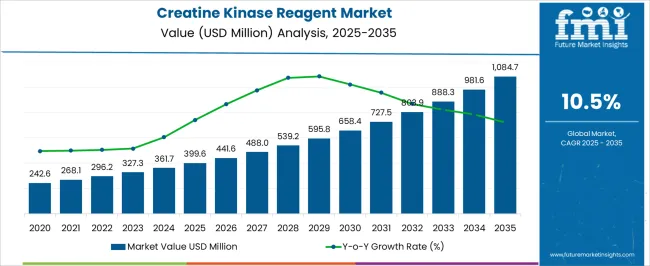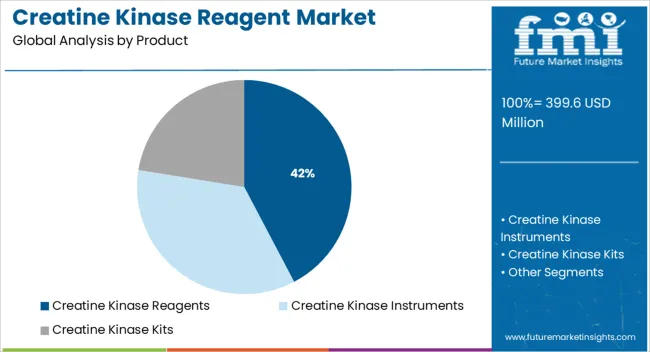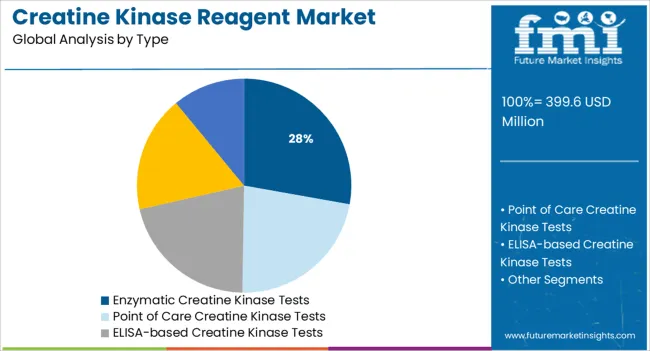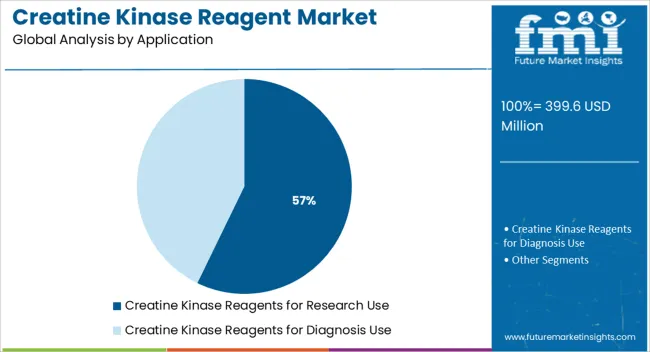The Creatine Kinase Reagent Market is estimated to be valued at USD 399.6 million in 2025 and is projected to reach USD 1084.7 million by 2035, registering a compound annual growth rate (CAGR) of 10.5% over the forecast period.

| Metric | Value |
|---|---|
| Creatine Kinase Reagent Market Estimated Value in (2025 E) | USD 399.6 million |
| Creatine Kinase Reagent Market Forecast Value in (2035 F) | USD 1084.7 million |
| Forecast CAGR (2025 to 2035) | 10.5% |
The creatine kinase reagent market is witnessing progressive expansion, driven by rising demand for precise biomarker testing in neuromuscular disorders, cardiac diagnostics, and drug discovery applications. Increasing investments in molecular biology and enzyme-based research have elevated the demand for high-purity, consistent reagent formulations. Laboratories and clinical institutions are prioritizing kits with high sensitivity and specificity, fostering the development of reagent systems optimized for automation and minimal sample preparation.
Continuous innovation in test formats and reagent stability has been instrumental in supporting long-term storage and reproducibility in laboratory workflows. With the research ecosystem expanding globally, and a growing emphasis on biomarker-driven diagnostics, creatine kinase reagents are becoming a critical input across both academic and industrial applications.
Regulatory compliance, data integrity, and quality certifications are further influencing purchasing decisions. The market outlook remains strong as demand from clinical diagnostics and life sciences continues to scale, supported by funding growth and advancements in assay standardization.
The market is segmented by Product, Type, Application, and End User and region. By Product, the market is divided into Creatine Kinase Reagents, Creatine Kinase Instruments, and Creatine Kinase Kits. In terms of Type, the market is classified into Enzymatic Creatine Kinase Tests, Point of Care Creatine Kinase Tests, ELISA-based Creatine Kinase Tests, Other Creatine Kinase Test Types, and Colorimetric Assay Based Creatine Kinase Tests. Based on Application, the market is segmented into Creatine Kinase Reagents for Research Use and Creatine Kinase Reagents for Diagnosis Use. By End User, the market is divided into Creatine Kinase Reagents for Hospitals, Creatine Kinase Reagents for Clinics, Creatine Kinase Reagents for Diagnostic Laboratories, Creatine Kinase Reagents for Academic Research Institutes, and Creatine Kinase Reagents for Other End Users. Regionally, the market is classified into North America, Latin America, Western Europe, Eastern Europe, Balkan & Baltic Countries, Russia & Belarus, Central Asia, East Asia, South Asia & Pacific, and the Middle East & Africa.

The creatine kinase reagents product segment is expected to hold a 42.3% share of the overall market in 2025, making it the most dominant category. This position is driven by the widespread use of ready-to-use reagent formulations across both clinical diagnostics and research laboratories.
The consistency and reliability provided by commercial reagent kits have streamlined workflow efficiencies while reducing the potential for human error. Reagent systems are being enhanced with optimized buffers and stabilizers to improve assay sensitivity and shelf life, contributing to their continued adoption.
Additionally, the availability of reagents compatible with automated analyzers has supported integration into high-throughput lab environments. The growing focus on standardization and reproducibility in creatine kinase testing has reinforced the role of dedicated reagents, driving their preference over in-house or manually prepared solutions across both emerging and developed healthcare settings.

The enzymatic creatine kinase tests segment is projected to capture 27.8% of the total market revenue by 2025. This is due to the high sensitivity and precision of enzymatic assays in quantifying creatine kinase levels across diverse sample types.
These tests have been favored for their ability to deliver rapid and accurate results, particularly in clinical settings where time-sensitive diagnostics are critical. Enzymatic tests also support automation and are adaptable to modern analyzer platforms, making them suitable for both point-of-care and laboratory-scale operations.
Improved enzyme formulations and detection chemistries have enhanced performance under variable sample conditions, which has driven their preference in diagnostic workflows. The increasing use of enzymatic methods in research and hospital laboratories continues to elevate their market share and relevance in both routine and specialized testing protocols.

Creatine kinase reagents for research use are anticipated to command 57.2% of total market revenue in 2025, establishing the application as the leading contributor. This leadership is primarily attributed to expanding applications in molecular biology, muscle physiology studies, and drug efficacy research.
Research institutions and pharmaceutical companies have significantly scaled their use of creatine kinase assays to assess cell membrane integrity, metabolic activity, and muscle damage models. The demand for high-quality reagents that deliver reproducible results has driven procurement from certified manufacturers offering validated documentation and batch-to-batch consistency.
Additionally, rising global R&D funding, academic partnerships, and preclinical testing pipelines are supporting consistent growth in reagent consumption. The flexibility of research-use formulations, which often support broader experimental parameters, has further reinforced their preference across non-clinical environments, positioning this segment at the forefront of ongoing market demand.
The increasing prevalence of cardiovascular disorders among the populace is the major factor propelling the growth of the creatine kinase reagent market. Cardiovascular diseases are one of the major causes of demise, because of the changing and unhealthy lifestyle. Thus, this leads to an increase in the number of patients suffering from cardiovascular disorders and is expected to drive the growth rate of the market in the upcoming years.
Furthermore, the advancements in technology are new opportunities for research and development applications. The budding demand for cardiaC testing kits, advanced development of creatine kinase reagents, and the sensitivity and high specificity of the creatine kinase reagents-based tests for accurate and efficient analysis are the aspects that are expected to fuel the market growth during the forecast period.
Moreover, factors such as the increasing geriatric population base, the growing prevalence of an unhealthy lifestyle among people, and unhealthy food and drink consumption, lead to obesity and are the attributes to the rising prevalence of target diseases. This demands the high requirements of ligases that are anticipated to be the major factors driving the market growth.
North America holds the largest share in the global creatine kinase reagent market owing to the well-established pharmaceutical companies, research institutes, and laboratories in this region. Additionally, the increasing scope of research and development activities in the countries like the USA is expected to accelerate the market during the projected period.
Besides North America, Europe and Asia Pacific regions are also expected to show lucrative growth over the forecast period. The increase in the population suffering from acute myocardial infarction, acute coronary syndrome, and other cardiac disorders is the major factor that is expected to fuel the market growth in Asia Pacific Region.
Some of the key manufacturers operating in the creatine kinase reagent market are BBI Solutions, Abbott, Beckman Coulter, Inc., Boditech Med Inc., DiaSys Diagnostic Systems GmbH, Fujirebio, Novus Biologicals, LLC., PerkinElmer Inc., Pointe Scientific Inc., Randox Laboratories Ltd., and Thermo Fisher Scientific.
| Report Attributes | Details |
|---|---|
| Growth Rate | CAGR of 10.5% 2025 to 2035 |
| Base Year for Estimation | 2024 |
| Historical Data | 2012 to 2024 |
| Forecast Period | 2025 to 2035 |
| Qualitative Units | Revenue in USD Billion, Volume in Kilotons, and CAGR from 2025 to 2035 |
| Report Coverage | Revenue Forecast, Volume Forecast, Company Ranking, Competitive Landscape, Growth Factors, Trends and Pricing Analysis |
| Segment Covered | Product, Type, Application, End User, Region |
| Region Covered | North America; Latin America; Europe; East Asia; South Asia; Oceania; Middle East Africa |
| Key Countries Profiled | USA, Canada, Brazil, Mexico, Germany, UK, France, Spain, Italy, China, Japan, South Korea, Malaysia, Singapore, Australia, New Zealand, GCC, South Africa, Israel |
| Key Players | BBI Solutions; Abbott; Beckman Coulter, Inc.; Boditech Med Inc.; DiaSys Diagnostic Systems GmbH; Fujirebio; Novus Biologicals, LLC; PerkinElmer Inc.; Pointe Scientific Inc.; Randox Laboratories Ltd.; Thermo Fisher Scientific |
| Customization | Available Upon Request |
The global creatine kinase reagent market is estimated to be valued at USD 399.6 million in 2025.
The market size for the creatine kinase reagent market is projected to reach USD 1,084.7 million by 2035.
The creatine kinase reagent market is expected to grow at a 10.5% CAGR between 2025 and 2035.
The key product types in creatine kinase reagent market are creatine kinase reagents, creatine kinase instruments and creatine kinase kits.
In terms of type, enzymatic creatine kinase tests segment to command 27.8% share in the creatine kinase reagent market in 2025.






Full Research Suite comprises of:
Market outlook & trends analysis
Interviews & case studies
Strategic recommendations
Vendor profiles & capabilities analysis
5-year forecasts
8 regions and 60+ country-level data splits
Market segment data splits
12 months of continuous data updates
DELIVERED AS:
PDF EXCEL ONLINE
Creatine Supplement Market Size, Growth, and Forecast for 2025 to 2035
Kinase Inhibitors For Cancer Treatment Market Size and Share Forecast Outlook 2025 to 2035
Kinase Inhibitor in Autoimmune Diseases Market Size and Share Forecast Outlook 2025 to 2035
Janus Kinase (JAK) Inhibitors Market
Protein Kinase B Inhibitors Market
Combination Kinase Inhibitor Market Analysis - Size, Share, and Forecast Outlook 2025 to 2035
Cyclin-Dependent Kinase Inhibitor Market Size and Share Forecast Outlook 2025 to 2035
Bruton's Tyrosine Kinase (BTK) Inhibitors Market
Reagent Bottle Market Growth & Industry Forecast 2025 to 2035
Reagent Filling Systems Market Analysis – Growth & Forecast 2024-2034
Grignard Reagents Market Demand & Trends 2022 to 2032
Flotation Reagents Market Size and Share Forecast Outlook 2025 to 2035
Myoglobin Reagents Market
Blood Bank Reagent Market Size and Share Forecast Outlook 2025 to 2035
Sequencing Reagents Market
Haptoglobin Reagent Market
Multichannel Reagent Reservoir Market Size and Share Forecast Outlook 2025 to 2035
Antioxidants Reagent Market Analysis – Trends & Future Outlook 2024-2034
Transfection Reagent Market
Fructosamine Reagents Market

Thank you!
You will receive an email from our Business Development Manager. Please be sure to check your SPAM/JUNK folder too.
Chat With
MaRIA